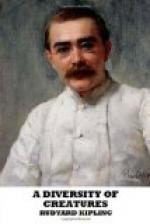Midmore’s relief when he found his story was not written across his aching temples for Mr. Sperrit to read—the defeated lover, like the successful one, believes all earth privy to his soul—was put down by Mr. Sperrit to quite different causes. He led him into a morning-room. The rest of the house seemed to be full of people, singing to a loud piano idiotic songs about cows, and the hall smelt of damp cloaks.
‘It’s our evening to take the winter cantata,’ Mr. Sperrit explained. ’It’s “High Tide on the Coast of Lincolnshire.” I hoped you’d come back. There are scores of little things to settle. As for the house, of course, it stands ready for you at any time. I couldn’t get Rhoda out of it—nor could Charlie for that matter. She’s the sister, isn’t she, of the nurse who brought you down here when you were four, she says, to recover from measles?’
‘Is she? Was I?’ said Midmore through the bad tastes in his mouth. ‘D’you suppose I could stay there the night?’
Thirty joyous young voices shouted appeal to some one to leave their ’pipes of parsley ‘ollow—’ollow—’ollow!’ Mr. Sperrit had to raise his voice above the din.
’Well, if I asked you to stay here, I should never hear the last of it from Rhoda. She’s a little cracked, of course, but the soul of devotion and capable of anything. Ne sit ancillae, you know.’
‘Thank you. Then I’ll go. I’ll walk.’ He stumbled out dazed and sick into the winter twilight, and sought the square house by the brook.
It was not a dignified entry, because when the door was unchained and Rhoda exclaimed, he took two valiant steps into the hall and then fainted—as men sometimes will after twenty-two hours of strong emotion and little food.
‘I’m sorry,’ he said when he could speak. He was lying at the foot of the stairs, his head on Rhoda’s lap.
’Your ‘ome is your castle, sir,’ was the reply in his hair. ’I smelt it wasn’t drink. You lay on the sofa till I get your supper.’
She settled him in a drawing-room hung with yellow silk, heavy with the smell of dead leaves and oil lamp. Something murmured soothingly in the background and overcame the noises in his head. He thought he heard horses’ feet on wet gravel and a voice singing about ships and flocks and grass. It passed close to the shuttered bay-window.
But each will mourn
his own, she saith,
And sweeter woman ne’er
drew breath
Than my son’s
wife, Elizabeth ...
Cusha—cusha—cusha—calling.




